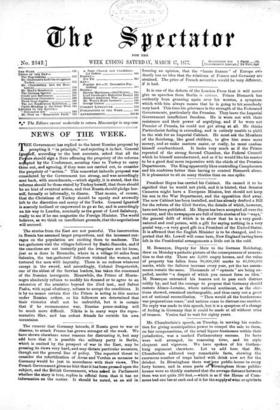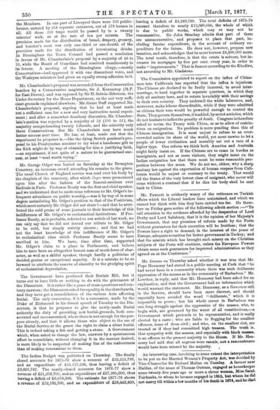Mr. Chamberlain's speech, on Tuesday, in moving his resolu- tion
for giving municipalities power to compel the sale to them, on fair compensations, of the retail liquor-businesses within their jurisdiction, was a marked Parliamentary success. Its facts were well arranged, its reasoning terse, and its style eloquent and vigorous. We have spoken of his Gothen- burg argument elsewhere. Let us add here that Mr. Chamberlain adduced very remarkable facts, showing the enormous number of traps baited with drink now set for the drinker. In Birmingham there was: lone public-house to every forty houses, and in some parts oMirmingham these public- houses were so thickly scattered that the average distance between them was not quite 200 feet,—which is as if the House of Com- mons had one bar at each end of it for the supplyof wine or spirits to
the Members. In one part of Liverpool there were 103 public. houses, entered by 218 separate entrances, out of 578 houses in all. All these 218 traps would be passed by in a twenty minutes' walk, or at the rate of ten per minute. The provision made for the distribution of bread, drapery, grocery, and butcher's meat was only one-third or one-fourth of the provision made for the distribution of intoxicating drinks. In Birmingham the Town Council had passed a resolution in favour of Mr. Chamberlain's proposal by a majority of 46 to 10, while the Board of Guardians had resolved unanimously in its favour. A meeting of the Birmingham clergy,—mostly Conservatives—bad approved it with one dissentient voice, and the Wesleyan ministers had given an equally strong adhesion to it.



































